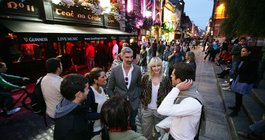
July 27, 2023
Sinéad O'Connor, the outspoken Irish singer who died Wednesday at the age of 56, attracted plenty of critics over the course of her nearly four-decade career. One of them was longtime Philly DJ John DeBella, who once was so incensed by the singer's views that he mounted a protest outside her 1990 concert at The Mann Center — only for it to fizzle amid thousands of screaming O'Connor fans.
O'Connor was at the height of her fame when she toured the United States in the summer of 1990. Her single "Nothing Compares 2 U" had topped the Billboard Hot 100 for four weeks that spring, making it the biggest hit of her career.
But she had already sparked controversy ahead of her Aug. 27 concert in Philadelphia for her policy on the U.S. national anthem: The singer refused to have "The Star-Spangled Banner" play before any of her shows, including one at the Garden State Arts Center (now the PNC Bank Arts Center) in Holmdel, New Jersey, just days prior. The venue traditionally played the national anthem before any event it hosted, but O'Connor would not go on stage until officials dropped plans to broadcast the song.
"I sincerely harbor no disrespect for America or Americans, but I have a policy of not having any national anthems played before my concerts in any country, including my own, because they have nothing to do with music in general," O'Connor explained in a statement following the concert. "There is a disturbing trend towards censorship of music and art in this country and people should be alarmed over that far more than my actions on Friday."
The Garden State Arts Center, which had agreed to O'Connor's requirement that the anthem not be played, then reacted by banning O'Connor from performing at the venue ever again, after the show. Others chimed in, too, like Hoboken-native Frank Sinatra, who threatened to "kick her ass." But the reaction was far from an isolated incident.
The puffed-up patriotism, fueled by the start of the First Gulf War a few weeks earlier, followed O'Connor to her Philadelphia show, where DeBella, working for WMMR at the time, planned a protest.
DeBella, who recently retired from WMGK, did not agree with his radio colleagues in New Jersey and New York who yanked O'Connor's songs from the air following the dust-up. He was still outraged, however, claiming her statements about censorship were actually censorious.
"I consider myself an American," he told a columnist with a Greensboro, North Carolina newspaper. "I'm for what this country is based on — free speech, the basic rights of liberty. I respect her right to be weird, to say she doesn't want the 'Star-Spangled Banner' played before her shows. But don't come to my country and tell me I can't do it."
"I don't like the idea of a foreigner telling us we can't sing 'The Star-Spangled Banner' whenever we want," DeBella said, according to other published reports.
DeBella staged a stunt outside the Mann Center, distributing 5,000 mini American flags to concertgoers. On his show that morning, he urged his listeners to wave the souvenirs at O'Connor during her performance.
"I got a negative response from maybe five carloads of people," he claimed.
But DeBella's protest didn't take off. The News Journal reported that "few (of the flags) were in evidence inside" as O'Connor entertained 6,600 enthusiastic fans. While a few men walked around the mezzanine with a larger flag, "flag-wavers who planned to sing the national anthem in protest were drowned out by the roaring applause that greeted the singer," the Philadelphia Daily News reported.
O'Connor would encounter much more pushback two years later, when she tore up a photo of Pope John Paul II on "Saturday Night Live" in protest of child sex abuse within the Catholic Church. Yet on that summer night at the Mann, she squashed her Philly critics by simply singing her sometimes angry, sometimes ethereal pop music.
Follow Kristin & PhillyVoice on Twitter: @kristin_hunt
| @thePhillyVoice
Like us on Facebook: PhillyVoice
Have a news tip? Let us know.